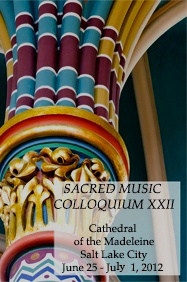Vivace! 104 July 2012
The Importance of Spirituality in Liturgical
Music
The Sistine Choir recently visited London and sang at
Westminster Cathedral. It was a wonderful occasion and I will be writing a few
articles about it (one is below). But first I want to focus on what for me was
the main thing that came out of this experience of hearing the Sistine Choir -
and that is the vital importance of spirituality in liturgical music.
In
a way this is more important today than it has ever been in the past. The world
is a violent and disturbed place and sacred music should provide a space where
people can not only take refuge but also experience the love and creativity of
God. We question where the soul of sacred music comes from and it’s not easy to
find a comprehensive answer – the mystery of God is beyond our
understanding.
The quality of the music being performed is highly
important. So much contemporary work is devoid of spirituality. Much of it is
well written and ‘comfortable’ but unfortunately it is banal and meaningless.
Christ so often said that one must take up one’s cross and follow him. The
quality of pain is rarely to be found in contemporary liturgical music; happy
clappy is fine but its expression is severely limited. The Resurrection came
from pain and death, it didn’t happen as a result of undisciplined and
unrestrained joy. Liturgical music needs to express the fullness of our belief.
It will not bring lasting peace to people if the quality of anguish is
missing.
Writing for the liturgy is a great challenge for composers.
Understanding of the text is essential and you cannot write well without this.
Technical competence and vocal knowledge are also important but the music must
spring from the composer’s own spirituality. It must speak from the
soul.
The attitude of conductors and singers is another factor.
Unfortunately for some choirs, singing at Services is primarily a musical
experience and the much wider context of spirituality is overlooked. This will
always show and cannot be hidden. A conductor has a responsibility to ensure
that a performance goes far beyond musical and technical perfection. Both are
essential but they are a means and not an end. The choir is expressing beauty
and belief in a totally unique manner.
I have also been much impressed by
the congregational response to hymnody. Hymns mean much and speak to people’s
deepest feelings. The appeal of a good hymn is universal.
As the Pope has
said, sacred music is an important part of the process of evangelization: this
places a great responsibility on the shoulders of the liturgical musician. We
need to be aware of the meaning of sacred music and our singing must be infused
with prayer and religious feeling. We must never allow our music to become a
‘whited sepulchre’: it must always display a deep internal meaning.
Colin
Mawby KSG
Subscribe to:
Post Comments (Atom)

No comments:
Post a Comment